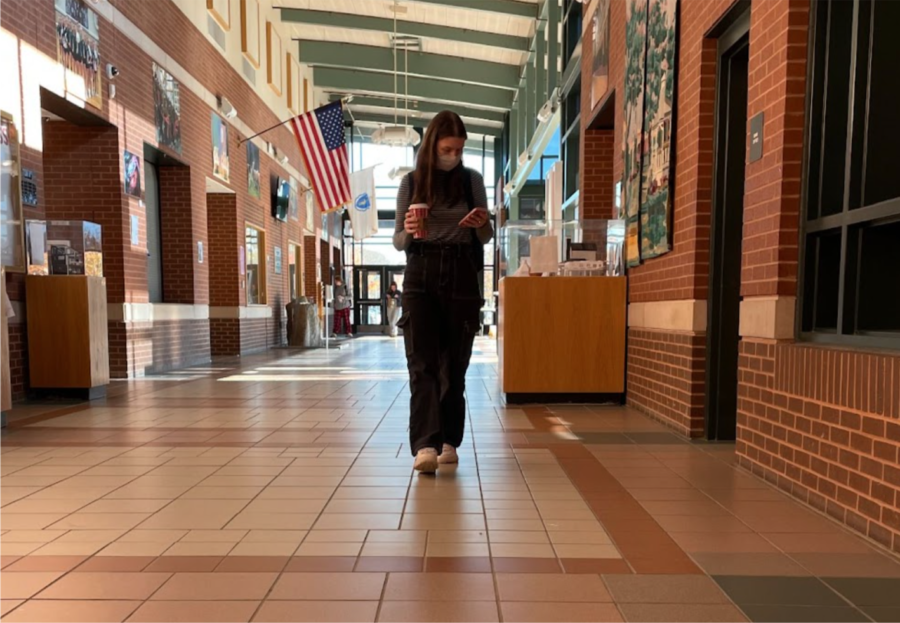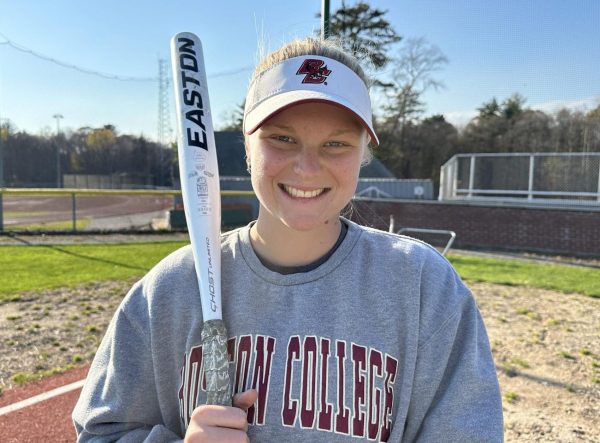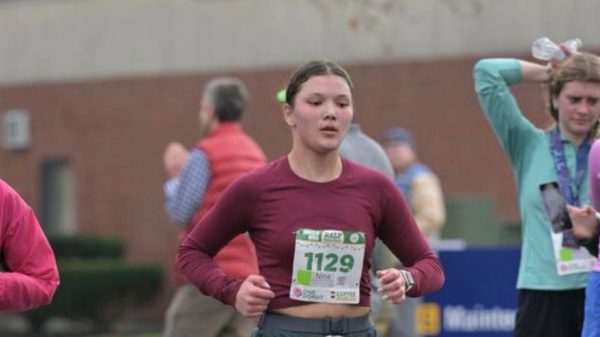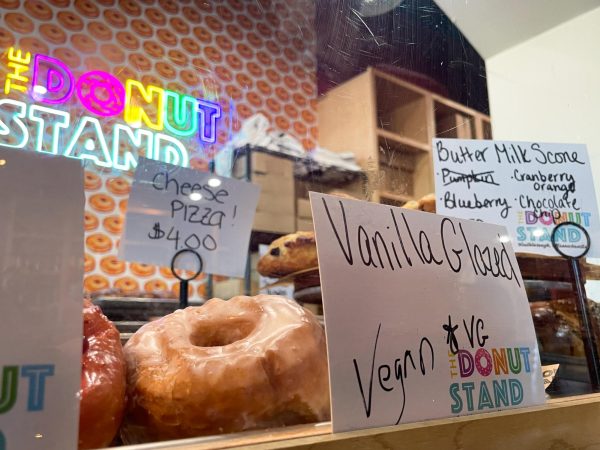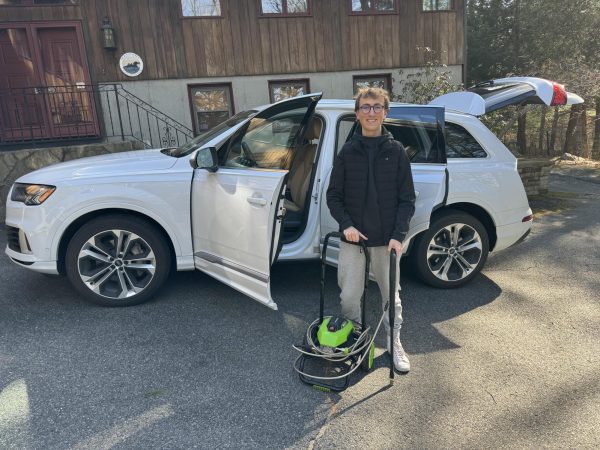The HHS Addiction
Senior Carly Ozmun walks to class sporting a Starbucks coffee after a study period. She is one of the many students on this Monday morning, 11/8, seen with her coffee
From coffee to tea, energy drinks to soft drinks, there is no shortage of caffeine at HHS. But for teens, caffeine can be unsafe if over consumed.
On a typical day, tired teens sulk through the halls of the high school carrying heavy backpacks to class, but in their hands―caffeine-fueled beverages.
Experts conservatively recommend most teens should drink under 100mg of caffeine a day. For adults, the recommended maximum is 400 mg. However, most popular coffees and energy drinks rack up anywhere from 150 mg to 300 mg of caffeine.
A large Dunkin’ coffee contains about 300 mg of caffeine, while energy drinks like Celsius and Bang contain 200 mg and 300 mg respectively.
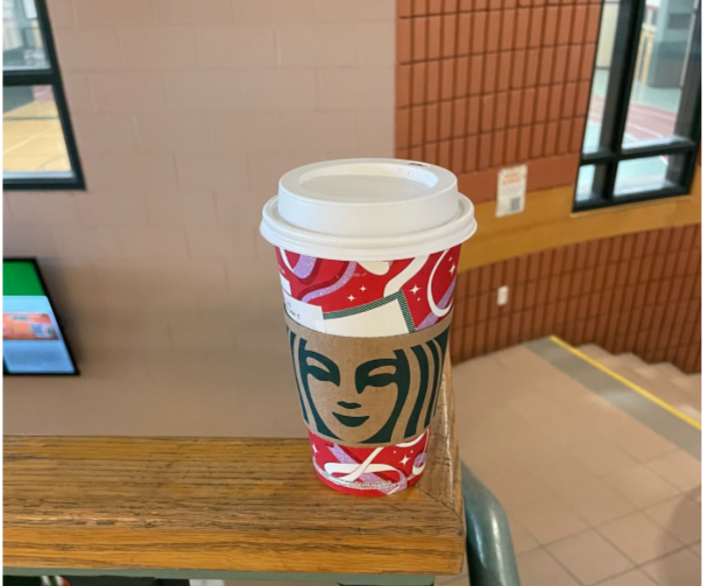
Students had a lot to say about caffeine.
A number of seniors and juniors reported daily caffeine consumption, sometimes even 100mg over the daily recommendation. A similar sample of freshman and sophomores said their caffeine intake was minimal or limited.
Caffeine is a drug that is both naturally found and artificially made and used as an additive in foods and drinks. Caffeine itself is not bad. Caffeine can be found in popular medicines, like Excedrin, used to treat migraines and Midol used to treat menstrual cycle symptoms.
Like most drugs, caffeine has real effects on the human body. While it can make some consumers feel alert and attentive, consumption can also lead to anxiety, jitters, stomachache, headache, and gastrointestinal issues.
There are many reasons why teens consume caffeine. Most of which being for focus, alertness, and popularity.
“It tastes good, and when I occasionally drink coffee it’s to keep me awake,” senior Hailey Glassburn said. “I need it to complete my assignments.”
“A misconception for high schoolers is that they only drink caffeine to wake up. When I’m bored, I like going to Starbucks. It’s a place to drive,” senior Carly Ozmun said.
“Honestly, I just like the taste. I don’t think it really does much for me, but in my head, it’s like, ‘Ok, let’s give a little kick to our day,’” junior Sara Squatrito said.
Teens today are under intense pressure. As colleges become more selective, students are under more pressure to do well in their classes and participate in extracurricular activities. To cope, students are staying up later to finish homework after these activities.
When asked if they feel that their caffeine intake is influenced by academic pressure, the responses were varied. While a little over half said yes, the rest said no.
“If I could sleep in and didn’t have to go to school, I wouldn’t have to drink caffeine,” junior Erin Belger said.
“When I have a lot of work I will have some coffee, like late at night or a Monster to try and stay up and finish my work,” Squatrito said.
Senior Sreya Ravi doesn’t drink caffeine, she reconsiders her decision daily.
“Everyday, I reconsider staying sober from caffeine, because I am so tired all the time and I crave the alertness caffeine gives me,” Ravi said. “With the intense stress and pressures of school, personal life, hobbies, social obligations, and extracurriculars, sometimes my sleep patterns become erratic. And it is such a hard decision to stop myself from consuming caffeine.
“It’s scary seeing my friends have such a high tolerance for caffeine at such a young age and needing several shots of espresso or drinking strong energy drinks to function. It’s insane. I never see that level of consumption during holiday breaks and such when school-related stress is lower,” Ravi stated.
Popular culture has also popularized caffeinated drinks. Brands like Starbucks and Dunkin’ specifically advertise to teenagers and young adults, and influencers all over social media can be seen sporting Starbucks or Dunkin’ cups.
The popularization of caffeinated beverages has greatly contributed to the increase in teen caffeine consumption. Starbucks’ marketing strategy specifically caters to the 13-17 age group to create long-term consumers. The 18-24 age range actually accounts for 40% of Starbucks sales as of 2020.
Studies have indicated that about 82.3% of teens actually consume caffeine on a regular basis, while 96% would classify themselves as occasional caffeine users.
Across all grades, average caffeine consumption was 2-5 times a week.
“I drink it once a week. I love iced coffee,” sophomore Lillian Gallagher said.
“I feel academic pressure fuels students’ need for caffeine… I drink a caffeinated drink about 4 times a week,” sophomore Hannah Connors said.
“3-4 times a week… I like the taste of iced coffee,” freshman Zoe Adams said.
44.6% of teens worldwide report that they consume caffeine 1-6 times per week, and 11.8% daily, according to Medical News Today.
Caffeine consumption also has an effect on teen sleep habits, mental health and development in teenagers.
The half-life of caffeine is about five to six hours, meaning that caffeine can still be present in someone’s system for up to twelve hours, which can affect sleep, further exacerbating the issue of feeling tired, and leading to more caffeine consumption.
Another issue with caffeinated drinks is that many of them contain high amounts of sugar or high amounts of fake sugar, which has poor effects on teen health as well.

